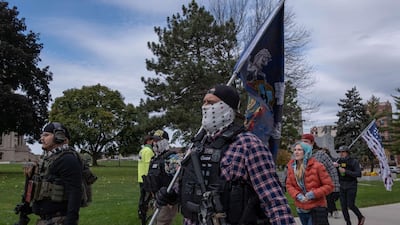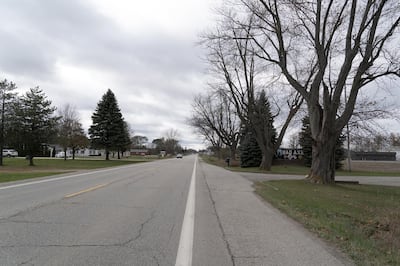Early one morning in late October, agents from the Federal Bureau of Investigation descended on a small, dilapidated farmhouse in rural Michigan.
They arrested two men, including the self-proclaimed leader of a paramilitary group called The Base.
The organisation was established in 2018 and espouses neo-Nazi and white supremacist beliefs. But the group is more sophisticated than your average militia — of which there are dozens in Michigan.
“The Base seems to have more of the features of groups that you would see on the international terrorism side,” said Javed Ali, a former FBI agent who is now a professor at the University of Michigan. “They’re not posting on the internet with tongue-in-cheek kind of memes and hinting at violence, they organise to engage in violent action, much the same way that terrorist groups do.”
In that early morning raid police arrested Justen Watkins, 25, whom prosecutors say was committed to inciting a race war in the US.

Law enforcement believe he was running a “hate camp” out of the 3.5-acre property, which is two hours north of Detroit. “They have tried to create these hate camps for paramilitary training, they try to recruit members who have tactical proficiency or operational experience with law enforcement or the military,” said Mr Ali.
News of the arrests shocked many in Bad Axe, a community of just over 3,000 people. “It’s a small town so you don’t think about stuff like that happening here,” said Michelle Franzel, a cashier at The Corner gas station just down the road from where Mr Watkins was living.
While the arrests were shocking, Ms Franzel said she wasn’t completely surprised.
“People keep secrets so easily and so it’s shocking that in such a little town that that would happen, but it does happen and it’s crazy.”
The small farming village is conservative, its wide, open fields dotted with Trump signs. Ms Franzel and her colleague Roxy Gingerich believe there is an undercurrent of racism amongst some. “I think it’s gotten worse since four years ago thanks to the president we have now,” said Ms Gingerich. “It's actually come out more, I’m sure it’s always been there but it's always been where not very many people would say or hear it.”
Not the only threat in town
The arrests of the two Base members came just weeks after federal law enforcement broke-up a plot to kidnap Michigan’s Democratic Governor Gretchen Whitmer. The FBI arrested 13 suspects who were charged with both the kidnapping plan and for plotting to target law enforcement and attack Michigan’s state capitol building.
FBI documents revealed the men claimed to be defenders of the US Bill of Rights. It’s believed, among other issues, they were unhappy with Governor Whitmer’s coronavirus pandemic shut-down orders, which they saw as a violation of the Constitution. In April, some of the arrested members, as well as other armed citizens, stormed Michigan’s State House in protest against the lockdown orders.
Michigan has a long history of militias. In the early 1990s, militias and other paramilitary groups started popping up all over the state and the country. Many were inspired by the incidents of Ruby Ridge, Idaho and Waco, Texas — federal law sieges that ended in violence.
For a brief period, militias — including the Michigan Militia — which is a paramilitary organisation, bloomed. They quickly wilted, however, after the Oklahoma City bombing in 1994.
A total of 168 people died when Timothy McVeigh and Terry Nichols blew up the Alfred P Murrah federal building in downtown Oklahoma City. Nichols was a Michigan native and the two may have attended Michigan Militia meetings, although the group denies they were ever members. But the connection, however tenuous, brought the group and others like it under the spotlight.
In the last four years, there has been a resurgence of militias and far-right groups across the US. The last few months have seen a flurry in their activity, especially in Michigan.
Mr Ali attributes that to three main factors: the impact of restrictions related to the coronavirus pandemic, the rise in the Black Lives Matter and other social justice movements, which creates a “left versus right” mentality and the increasingly divisive political discourse within the US, which becomes even more polarised around elections.

Fears of violence after the election
A recent report by the Armed Conflict Location and Event Data Project pinpointed Michigan, Georgia, Pennsylvania, Wisconsin and Oregon as states at risk for increased militia activity during and after the election. “We believe the days after the election could be among the most fraught,” said Lindsey Schubiner of the Western States Centre, an organisation that fights for social justice causes. “If we see delays in the vote count, far-right groups may try to seize the moment.”
For weeks, President Trump has claimed Democrats will rig the election and said he may declare victory if he appears to be ahead on election night, even before all the votes have been counted. If his rival Joe Biden is in the lead, he told supporters he would take the fight to the Supreme Court and has encouraged them to go into the polls as observers and “watch very carefully” to make sure there is no cheating.
In Michigan, his call is being answered by hundreds of conservatives who have trained and registered as GOP-poll observers, some of whom may be armed with guns.
“From the perspective of the far-right, election day is really perceived as the culmination of months of widespread mobilisation,” said Cassie Miller, a researcher for the Southern Poverty Law Centre. “In this year’s incredibly polarised political climate and with the far-right so highly mobilised there is a very real concern that far-right extremists and militias and armed vigilantes will appear at polling places in an attempt to harass and intimidate voters and that threat is especially pressing in battleground states.”
Fears of post-election violence were further raised on Friday, when trucks and cars driven by Trump supporters surrounded a Biden campaign bus in Texas, prompting an FBI investigation.
While there is potential for election-related violence, Mr Ali said he believes that the threat posed by far-right groups like The Base and other self-styled militias that have gravitated towards domestic terrorism extends beyond different election outcomes.
“My assessment is this far-right threat that we’re experiencing and we’re seeing manifestations of now in Michigan, this is going to become a permanent feature of the United States,” Mr Ali said. “Much like the global jihadist threat was a permanent part of the security landscape for about 15 to 20 years after 9/11, the same thing might be the case now with far-right terrorism here in the US. I think this is something we’ll be wrestling with far down the road.”



